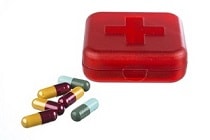Preparing People with Epilepsy
Beyond the basic steps above, people with epilepsy have special needs to consider. Keep yourself safe and teach others how to help you.
Think about what you can do now to be ready:
Think about what you can do now to be ready:

If you miss just 1 dose of medication, you can lose control of your seizures.
Keep your medications with you.
- Taking your medications on time can help prevent seizures. When you leave your house, carry a 3-day supply of your medications in a safe and waterproof location. This way, if you are stranded from your home you will not have to miss a dose.
Have a medical alert bracelet or other identification with you.
- In case you have a seizure while in an emergency shelter, first responders will know how to better assist you during your seizure.
Identify a family member, neighbor or friend to help you during an emergency.
- Talk with people now (such as your family, neighbors, co-workers, school personnel, and friends) about what to do if you have a seizure.
- Teach people how to help you in case you have a seizure.
- Keep a list of important phone numbers handy, including your health care provider and pharmacy.
If possible, know what triggers your seizures.
- For some people with epilepsy, seizures can be triggered by flashing lights, sounds, lack of sleep, stress, or other triggers. Talk with your health care provider about what triggers your seizures and how you might avoid them during a crisis. You can learn more about triggers and managing your epilepsy through WebEase, a free online program.

“Living in a hurricane zone requires us to take a look at our ‘Go Bag.’ When we receive a hurricane warning, I place a 10-day supply of meds in a waterproof container for both Tom (my husband) and Mikey (our son). We keep other things in our ‘Go Bag’ such as copies of our health insurance cards.”
